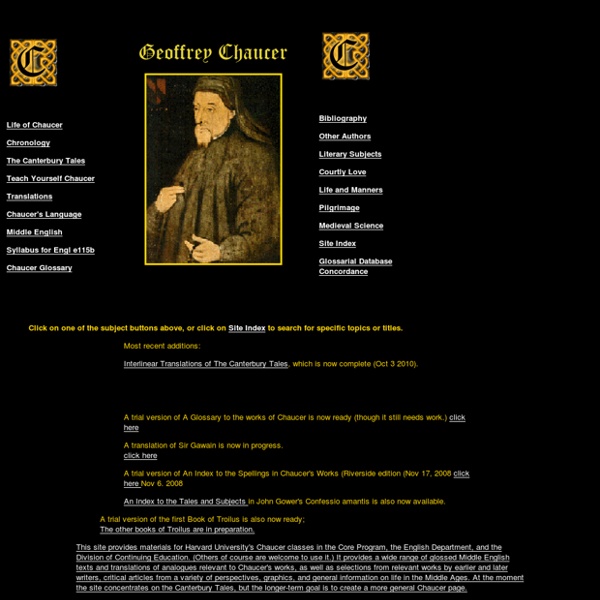



The Criyng and the Soun: Chaucer Audio Files | Baragona's Literary Resources The Chaucer Metapage Audio Files These are links to web pages with excerpts from Chaucer’s works read by professors. The main purpose of these recordings is to help students improve their pronunciation of Chaucer’s Middle English. The emphasis is on accuracy of pronunciation, according to the most current scholarly thinking, though you will notice some individual variation among the readers. Compact Disks of complete texts of individual works by Chaucer can be purchased from The Chaucer Studio Web Site. These sound files are in MP3 format (or WAV format or both). From The Canterbury Tales From Troilus and Criseyde From the Dream Visions From The Legend of Good Women and the Short Poems The Legend of Good Women, Prologue, Text F, ll. 1-39 read by Alison Baker of California State Polytechnic University. Like this: Like Loading...
The history of the English language - an introduction English is a member of the Indo-European family of languages. This broad family includes most of the European languages spoken today. The Indo-European family includes several major branches: Latin and the modern Romance languages (French etc.); the Germanic languages (English, German, Swedish etc.); the Indo-Iranian languages (Hindi, Urdu, Sanskrit etc.); the Slavic languages (Russian, Polish, Czech etc.); the Baltic languages of Latvian and Lithuanian; the Celtic languages (Welsh, Irish Gaelic etc.); Greek. The influence of the original Indo-European language can be seen today, even though no written record of it exists. Of these branches of the Indo-European family, two are, as far as the study of the development of English is concerned, of paramount importance, the Germanic and the Romance (called that because the Romance languages derive from Latin, the language of ancient Rome). East Germanic was spoken by peoples who migrated back to southeastern Europe. Global English
Chaucer's Language Understanding Middle English If you have no experience at reading Middle English, the primary obstacle to appreciating the General Prologue is the language itself. Chaucer's English is over 600 years old, but it is still recognizably English, and with a little effort it can be understood. In fact, one of the great benefits of reading Chaucer is learning this older form of English, one that allows us insight into the minds and lives of the people who spoke it. At first the going is slow, and the language is full of words and phrasing that are at best unusual, at worst incomprehensible.
Texts and contexts on Chaucer
and life in the Middle Ages. by nda_librarian Apr 30